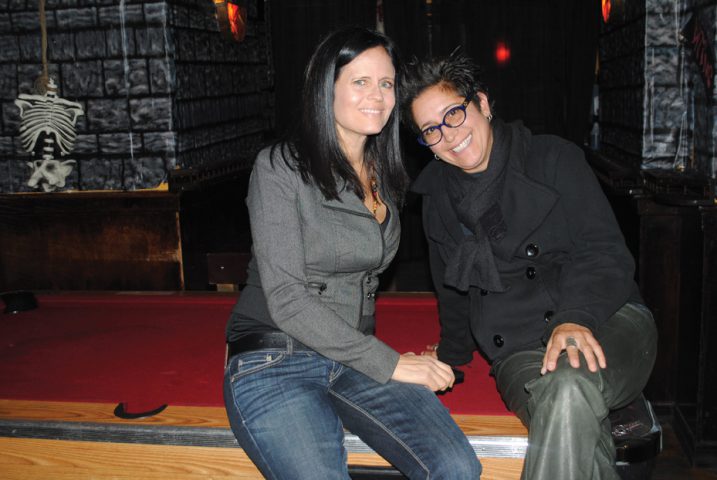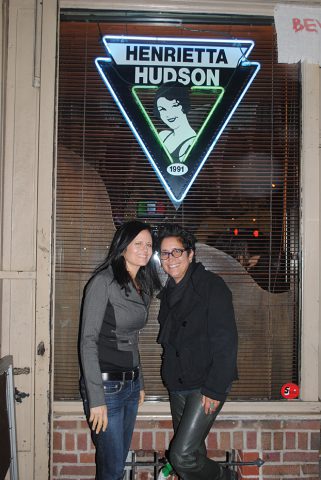The Berlin Wall fell, the Soviet Union dissolved and the Cold War ended. The first American Patriot missiles of Operation Desert Storm landed in Iraq. The Dow Jones Industrial Average closed above 3,000 for the first time ever; Silence of the Lambswon the top four categories at the Academy Awards. And on the corner of Hudson and Morton Streets, Henrietta Hudson Bar & Girl opened for business.
In 1991, Cubby Hole, the longtime gay bar now located on West 12th Street, occupied the ground-floor space at Hudson and Morton. Lisa Cannistraci was a bartender there. “I used to laugh on the inside” when regular customers would suggest she open her own bar, she says. One of those regulars was Minnie Rivera, a nightlife promoter who wanted to take over the corner space and open a new lesbian club.
After some prodding, Cannistraci changed her mind: “It became a calling—it was something I had to do.” Rivera brought in Joey D’Angelo, a longtime club owner, to be the third partner. (Today Rivera and D’Angelo remain partners, while Cannistraci is the operating owner.) Lisa Graziano, now the managing owner, started as a bartender and DJ.
Cannistraci chose the bar’s memorable name to “feminize” that of the English explorer who claimed New York’s harbor for the Dutch. Henrietta Hudson was an overnight success, due to the owners’ 18-hour workdays, a dedicated staff and the fortuitous moment in which for “pretty girls,” says Graziano, the kind that embodied the early-90’s lesbian chic aesthetic and puzzled the media with their stylishly femnine look. “It was a lipstick lesbian scene; Madonna and Sandra Bernhard were the models,” Cannistraci remembers. “Lesbians were coming out of the closet. It was cool to be a lesbian. It helped the business, of course— Henrietta’s was a big part of that trend.”
The West Village was the epicenter of New York’s gay community, but it was still rare to see gay couples holding hands in public. The AIDS crisis had had a devastating effect on the gay nightlife scene, and the direct-action groups like Queer Nation and the Lesbian Avengers were just getting started. Henrietta’s founders sought to open a place where women could go to meet other women, and feel safe in a welcoming environment designed just for them. “We wanted to put a place on the map where people could come out and be gay,”
Graziano tells GO. “Twenty years ago, you couldn’t just walk down the street, all happy and gay and kissy and lovey. So we opened a place where people could go and be themselves. That’s the most important thing; even to this day, people want a place to go.”
That mission has remained true for two decades, despite the vicissitudes of the neighborhood and the lesbian scene Henrietta’s helped foster. “The West Village itself is not what it used to be. A lot of families have moved or condo, and that means they’re going to be watching us seven days a week,” Graziano says. “We work really hard with the Community Boards. Getting past these [hurdles] is a huge part of our success. We’re really proud of the work we’ve done that because it’s not easy to succeed in the city.”
Today’s lesbian nightlife scene has changed too. Back in 1991, a small handful of full-time lesbian bars—the Duchess, Rubyfruit and the Grove Club among them—vied with a similar number of promoters with their own signature events. Shescape held its long-running party Private Eyes, while Cynthia Russo’s Her/She Bar and Julie Tolentino’s notorious Clit Club enjoyed years-long runs at several venues. Now, the scene is dominated by independent promoters launching parties, many with shorter life spans in competition with the seven night-a-week bars. But despite the high overhead, community-based headaches and fickle tastes of the public, Graziano is adamant that Henrietta’s fulfills a need, even after 20 years. “Henrietta’s prides itself on serving the lesbian community. We’re lesbian-owned and -operated, and you can one-hundred-percent rely on Henrietta’s to be there. We’re open all the time—during hurricanes, blackouts, every single holiday,” she says. “We’re providing a service that’s unprecedented, really. We’re providing a place for people to go out in New York City. People complain, ‘it’s not this, it’s not that,’ but we’re here with open arms.”
Acknowledging the role independent promoters play in the scene, Henrietta’s has collaborated with a few hand-picked promoters to expand the bar’s reach. They most recently partnered with Nikki Hill of Spice NYC and “Sir” Sabrina Haley for Siren during Pride weekend last June. “It changes the way we do things,” Graziano says about sharing the nightlife landscape with independent parties. “We’ve teamed up with other promoters because we wanted to throw bigger parties, outside of our venue. We’re always open to teaming up with other people.”
On November 10-12, Henrietta’s will celebrate 20 years of memories with a series of parties, performances and surprises. On Thursday November 10, Cannistraci and Graziano will host a cocktail party for former and current staff and customers, featuring hors d’oeuvres, special guests and a photo exhibition of Henrietta’s through the years. The party will continue all weekend with DJs, MCs, giveaways and drink specials.
One never knows what might go down in the wee hours: Graziano’s favorite memory from Henrietta’s is the time a local singer performed a Melissa Etheridge song at the weekly live music showcase. The singer belted out the chorus with her eyes closed, lost in the melody, and failed to notice Etheridge herself emerge from the back of the room to join her onstage. When she opened her eyes, she almost fell off her stool as the crowd went crazy.
Even with Henrietta’s string of legendary moments and storied history, Cannistraci feels her greatest achievement is providing a vital service to the lesbian community in New York. “We run a tight ship. We found a way to stay in the West Village during the Giuliani years, as well as during the recession,” Cannistraci reflects. “We’ve been doing it for 20 years and doing it the right way. We haven’t taken anything for granted. Our biggest accomplishment is growing as a business with a conscience.”



What Do You Think?